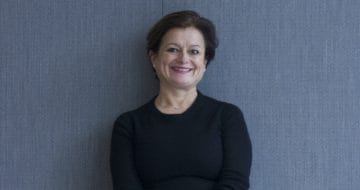Mayer Brown associate Charlotte Tarr discusses the benefits of working in a small team and how she trained and qualified while managing a cancer diagnosis

“We’re a small team of just five”, says Charlotte Tarr, an associate in the financial services regulatory and enforcement practice in Mayer Brown’s London office. The practice includes more than 20 lawyers in London working across different disciplines, but it is led by the core team that Charlotte is part of. Speaking with me an hour before she’s needed on another call, she tells me excitedly that it’s a client pitch she’s looking forward to: “I can’t go into details, of course, but it’s one of those situations, where it’s a fascinating client, and you just really want to be involved”, she says smiling.
Charlotte, who qualified in spring of 2023, tells me a little bit about her practice and the work they do. “Our team is really interestingly split. One of the partners who does regulatory work sits in the contentious area of our firm, while the other partner sits in finance. So, we get a really good opportunity to experience both ends of the spectrum — contentious work, as well as the more advisory side of things”.

Being part of an expanding team brings with it unique opportunities. “What’s exciting about this is that after the partners, it’s directly just myself and the other associate. So, we’ll do the classic things an NQ anywhere would be doing, like filing applications with the Financial Conduct Authority, but we also go all the way up to assisting with writing due diligence reports”, explains Charlotte. What this means in practice is lots of exposure and a non-hierarchical team where trainees and associates are comfortable to ask questions, gain experience and build their own knowledge. “We’re not just engaging with the black-letter law, but are learning how to pitch, budget and understand client needs from a very early stage — that experience over two to three years will just be invaluable to our growth”, she says.
Coming with the territory of being in a small team is high levels of responsibility, and Charlotte tells me that the team’s two associates get involved in a lot of “matter management”, something more typically reserved for senior team members. “This means being able to know the progress on any given matter the partners are working on — so in the first and last parts of my day I’m checking where the matters are up to, what needs to be done and finally what’s been completed”, she says.
If you’re worried that the small team and responsibility mean hurried lunches and a skewed work-life balance, then fret not. Charlotte assures that the latter is a priority, with the partners aiming for the team to have 6 pm finishes every day, and no emails disturbing team members when they’re off on holiday. As for lunch, she tells me that the break is a must for her. “Advisory work is academically intensive” Charlotte says. “It’s someone coming to you, often with a unique problem you’ve never heard of in a grey area where the law is changing incredibly quickly Think crypto, for example.” To summarise, if you like work that’s constantly evolving, then advisory is for you. While there certainly is some long-term work, for the most part, the team can be handling over ten active matters in any given week — and that’s quite different from some other practice areas, like litigation, explains Charlotte.
I went on to ask Charlotte how, as a lawyer, she navigates the tension between regulations that may not yet reflect market developments fully, and clients, who want precise legal advice in grey and fast-changing areas. “. The most that any lawyer can do is try to stay on top of all the developments that are happening and there’s plenty of resources that help you do that. Legislation takes a long time to come through, but in the meantime, there’s consultation papers, internal firm newsletters, team meetings and other such resources that track development. The key is to understand the needs to the specific needs of clients and the parameters you are working within to help that client.”
Hearing Charlotte speak so positively about her work and her time at Mayer Brown so far prompts me to ask her what made her apply to the firm in the first place. “I went through the application process twice. I received and turned down a training contract offer from another firm right after I graduated from university, and decided instead to go travelling for three years”, she says.
It was a Stage 4 cancer diagnosis and subsequent treatment which meant she had to stop travelling, and it was at this point that she thought carefully about what she wanted to do for the next few years. “Straight away, my priority was having a small cohort. Everyone knows who you are, and you’re a lot more likely to get the seats that you want,” Charlotte details.
However, Mayer Brown’s appeal didn’t stop at that. She stresses that the firm’s support in relation to her diagnosis, which entails lifelong treatment, has been incredible. “There was a period of time before I had started my TC, where my diagnosis got very scary — it jumped from Stage 3 to Stage 4. I called up graduate recruitment to withdraw my acceptance, because I knew I was going to have to go into very intense treatment, and I didn’t want to mess them around”, she says.
“But the firm insisted that this was something they could work with to support me. When I had my first major surgery, to remove my lung, a week before the start of my TC, the senior partner said my start date could be pushed back six months. I was also given the option to train from home — and this was pre-Covid, when working from home was not prominent.” Charlotte goes on to say that she has come across several people within the firm with a range of conditions, often long-term, and there is always the sense that they are well-supported. For example, Mayer Brown’s new ‘Enable’ network, which she helped set up, is specifically designed to support those at the firm with long-term disabilities. “I think the firm is incredible, and really, when they treat you so well, you want to work well and reciprocate”, says Charlotte.
Charlotte also stresses that interviewing and delving into an area like Financial Services, which you might not be well-acquainted with, does not have to be intimidating. “Financial services was the last seat of my training contract and I did not plan to qualify into it when I started, as I was just coming out of a seat I absolutely loved and was convinced I’d qualify there. So, when I realised I really liked regulatory and needed to become more knowledgeable about the area quickly, I started by listening to podcasts covering the basics of crypto, funds and regulation on my commute. It’s a niche area, and you’re not expected to know everything inside out — but if you have the basic knowledge and do a bit of research that’s going to go a long way,” she reassures.
“The second thing I did was to set up my news alerts. You’ll need to be updated on what’s going on in the market. Lastly, when it comes to interviews, email and ask who’s likely to be on the panel — most people don’t do this, but it’s hugely helpful to get to know your interviewers before you meet them. Also make sure you’ve researched the size of the team you’re interested in. If you bring up work you’re interested in doing, and the team doesn’t do that, then you lead your interview into an awkward moment”, she advises.
Hear from Mayer Brown lawyers at ‘Banking & finance showcase — with Mayer Brown’, a virtual student event taking THIS AFTERNOON (31 October). Apply for one final few places now.
About Legal Cheek Careers posts.


